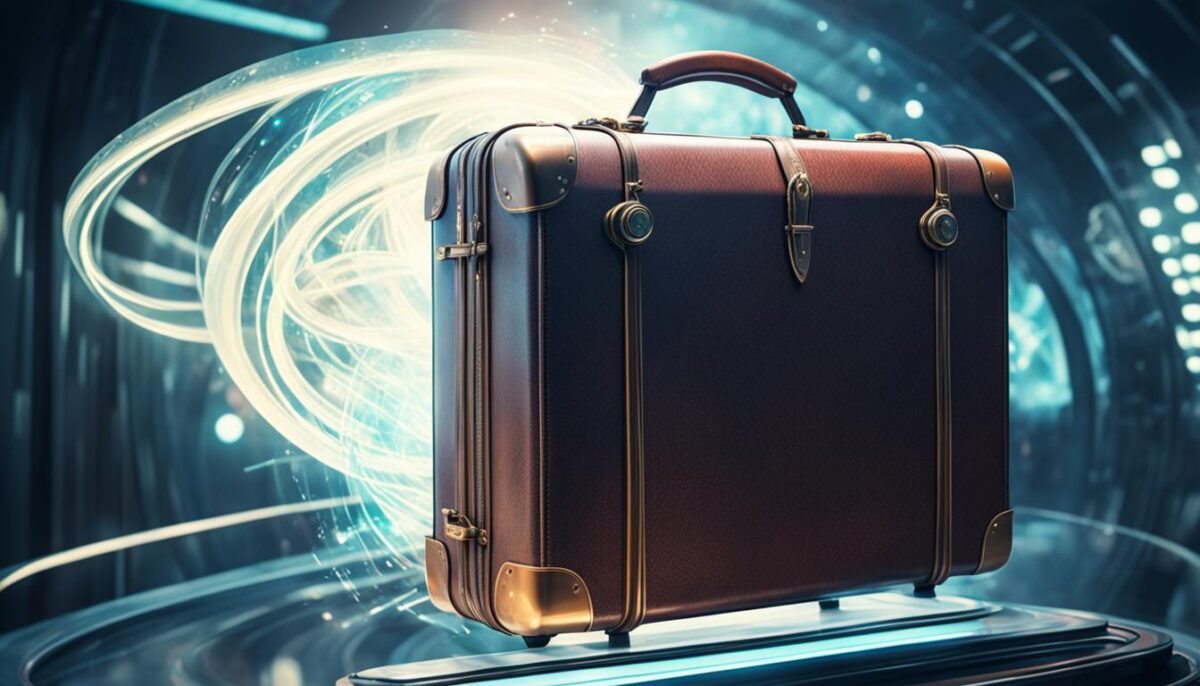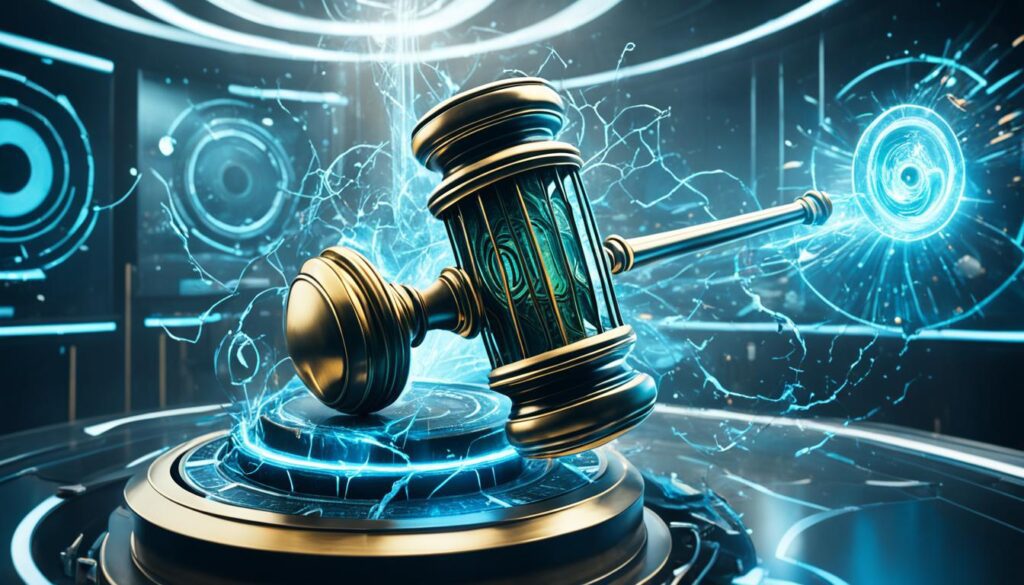Imagine stepping into a time machine and traveling back to key moments in history. Or seeing the future, checking out new tech and social changes. Time travel’s fascinating idea has sparked lots of stories and debates. But, can we really change time, or is it just fiction?
Let’s dive into the basics of time travel theories, mechanics, and how science sees it. We’ll cover quantum physics and effects on the past and future. Soon, you’ll understand the deal with parallel universes and the big risks of time travel.
Are you into this idea or just curious? This guide will give you a deep dive into time travel. We’ll start by answering the big question: What if time travel were possible, and we could witness history unfold before our very eyes?
– Find out the key theories and science behind time travel
– Learn about science fiction’s role in ideas about time
– See how time travel could let us see big historical moments
– Understand the ethics and risks of changing the past or future
– Get a handle on the idea of different timelines and complications of time travel
Understanding Time Travel Fundamentals
The study of time travel explores exciting concepts and theories. It’s based on the idea that time can be changed by altering the space-time continuum. Einstein’s theory of relativity argues that time is not fixed. It can be shaped by the way we interact with the world around us.
Theories and Concepts of Time Manipulation
Time travel has long intrigued researchers. They aim to use this power for different reasons. From Einstein’s ideas to modern quantum physics, we’ve learned a lot. We discovered how time is linked to the universe’s physical laws. This has given us clues about how time travel might work and the challenges it faces.
Quantum Physics and the Nature of Time
Quantum physics has changed our view of time and time travel. It introduces ideas like superposition and quantum entanglement. They hint at multiple universes or timelines. These concepts shake up our old thoughts of time as just a straight, unchanging line. As we study quantum mechanics more, we get closer to understanding time travel. We learn about ways to adjust the fabric of reality.
Paradoxes and Pitfalls of Temporal Manipulation
Despite the excitement, time travel faces big hurdles. The grandfather paradox is famous for showing the risks. It asks if changing the past would cause huge problems. Scientists and thinkers also deal with other puzzles, like the bootstrap paradox and information paradox. They challenge our understanding of time and cause-and-effect. As we move forward with time travel, solving these issues is key. It helps us ensure that using such technology is safe and ethical.
time travel in Science Fiction
The idea of time travel has inspired many writers and fans of science fiction for years. H.G. Wells and Ray Bradbury were the first to take us on these adventures. Later, the movies “Back to the Future” and “Doctor Who” further fueled our interest.
Iconic Time Travel Stories and Movies
Books like “The Time Machine,” “A Sound of Thunder,” and “By His Bootstraps” are key in this genre. They show us the risks and rewards of changing time. Now, movies like “Back to the Future” and “Doctor Who” have brought these tales to life on the big screen.
Time Travel Tropes and Plot Devices
Time travel stories often reuse certain ideas to tell their tales. These include the time machine and newer ideas like quantum tunneling. The stories make us think about the butterfly effect and other tricky situations that time travel might create.
Over time, the ways we talk about time travel have changed, but the stories keep coming. Authors and filmmakers love to use these plots to explore our curiosity about changing the past, present, and future. These tales make us think about time, knowledge, and the right way to use such a powerful ability.
Historical Events and Time Travel Possibilities
Many people have dreamed of using time travel to see big moments in history. They think about events like the signing of the Declaration of Independence or Julius Caesar’s death. The fall of the Berlin Wall is another important event. These moments have changed the world we live in. Some day, technology might let us see these times for real. But, should we be able to change history? This question dives deep into what’s right and wrong.
Witnessing Pivotal Moments in History
If we could time travel, we’d learn a lot. Just imagine watching the birth of the new nation next to the founding fathers. Or seeing the Roman Empire fall. These scenes are key to understanding our world today. It would be like looking through a window into the past.
Ethical Considerations of Altering the Past
But, changing the past raises tricky moral and ethical questions. What if we could stop bad things from happening? Or make good events happen sooner? This brings up deep thoughts about fate, free will, and the nature of time. Plus, who would make the rules for time travel? And how do we stop it from being used in bad ways? The power to change history is a big responsibility. It needs careful thought about its effects on our lives.
As we get closer to being able to time travel, these questions become more important. If we could see and change history, what would that mean for the world? We need to think hard about how to use time travel the right way. We hold a big role in deciding our past, present, and future. This comes with big responsibilities to use time travel wisely and ethically.
Alternate Timelines and Parallel Universes
Imagine there are many worlds alongside ours, each with unique features. These worlds may run side by side with our own. The idea of the ‘multiverse’ theory explains how these different timelines might work. There’s talk in the scientific and philosophical circles about if these other worlds truly exist.
It’s a big deal because it might change how we view time and reality. Think about the crazy scenarios time travel stories show us. What if we could step into those other worlds? There are lots of questions and ethical issues to think about if that were possible.
Exploring the Multiverse Theory
The multiverse theory is like saying there isn’t just one universe but many. Each universe might follow its own rules and timeline. This theory isn’t just a wild idea; it’s backed by some scientific clues. Things like quantum entanglement and superposition hint that parallel universes could be real.
Imagine all the possible outcomes for every choice you’ve ever made. In these infinite universes, there could be versions of you doing all sorts of things. But could we actually travel to these other universes? The idea of time travel between these worlds brings up its own set of problems to figure out.
Consequences of Changing the Past or Future
Thinking about changing the past or the future with time travel is wild. Just one small action might lead to huge changes down the line. The “butterfly effect” is a great example of how these changes can spiral into major events. This concept has people in the time travel discussion wondering about the dangers and complexities involved.
One of the biggest puzzles is how to avoid messing up the timeline. The story of the grandfather paradox shows the issues with changing the past. But it’s not just about the rules of time travel. The ethical side, like not harming others while time traveling, is also a big concern. It raises a lot of questions about how much change is okay in the grand scheme of things.
Causality and the Grandfather Paradox
The link between time travel and causality is the basis of the “grandfather paradox.” It talks about a person who travels back and stops their grandparents from meeting. This would erase their own birth. Scientists and thinkers debate the effects of this paradox. It tests our grasp of the space-time continuum and if timelines can change.
The big question in the grandfather paradox is changing the past without causing confusion or paradoxes. It challenges causality, the idea that everything has a reason. If time can be altered, doesn’t that mess up the chain of events leading to the time traveler’s birth?
Some solutions to the grandfather paradox are parallel timelines or causal loops. They say changes in the past might not impact the original timeline. Instead, a new one might branch off. Also, quantum indeterminacy suggests that interacting with the past could create new realities, each with its path.
The grandfather paradox affects more than time travel. It makes us rethink time, free will, and how the space-time continuum works. Changing the past makes us question if the future can be changed. It also makes us wonder about the limits of what we can control. These debates shape our understanding of time travel.
Designing and Building a Time Machine
Designing and building a time machine is not easy. It involves understanding both basic science and the latest tech. You need to know theories, how the machine will work, plus the materials to make it. This goal excites the scientific world.
Theoretical Principles and Scientific Requirements
Time travel’s core is theoretical. Ideas like wormholes and warp drives are stepping stones. But making these ideas work needs leaps in science. It touches on areas like quantum mechanics and theoretical physics.
Reaching time travel’s goal is hard. We must solve complex problems in physics. It includes powering the machine, making sure it’s safe, and avoiding paradoxes. Scientists worldwide are working on these tough issues, exploring new frontiers.
Materials and Components for Time Travel Technology
To make a time machine, you need special stuff. This lets us control the basic laws of the universe. This includes being able to work with unique energy, use gravity well, and store a lot of data.
Materials like exotic matter and future tech are key. They might lead to big steps in time travel. Also, using quantum computing and smart technologies will help us build these machines.
Creating a working time machine is a big challenge. It needs non-stop efforts in science and tech. Understanding the universe’s basic elements is crucial.
Safety Protocols for Time Travelers
With time travel on the horizon, we must create strong safety protocols. They’re vital to keep time travelers safe and prevent harm to the time we visit. We’ll check out the hazards like diseases, facing unfriendly people, and how our actions could change history. It’s key to have the right training, gear, and plans to handle these risks. Plus, there needs to be clear safety guidelines and rules for time travel.
Preparing for Potential Hazards and Dangers
Time travel’s full of surprises and dangers. So, having solid contingency plans and emergency steps is a must. We’ll look at what could go wrong, like gear breaking, strange time shifts, or unexpected history encounters. Having more than one way out, with spare systems and plans, helps time travelers stay safe. Good tech, like emergency gear and medical help, improves how ready and safe travelers are. Also, it’s key to think about the laws and being ethical while doing time travel.
Contingency Plans and Emergency Procedures
As time travel evolves, having detailed contingency plans and steps is essential. These plans should cover all sorts of events, from gear issues to weird time happenings to surprising meetings in the past or future. By using backups, extra systems, and top tech for communication and health, we can deal with crises and go back to the right time. Making and using these safety protocols well is what will make time travel good, safe, and time-friendly for all.
Legal and Ethical Implications of Time Travel
Governing Laws and Regulations
The idea of time travel is getting more real. This makes it vital to look at the laws that will need to control it. We need laws that work across countries to handle who’s responsible, the use of time travel, and other legal topics. These laws should cover things like the rights of people who travel through time and who’s in charge of the information.
There will be rules to dot every i and cross every t. And if something goes wrong because of time travel, who should be held accountable will also be a question.
Philosophical Debates and Moral Dilemmas
The thought of time travel makes us rethink reality and the nature of choice. It starts philosophical debates and ethical concerns. Should we change history, and what about those paradoxes people talk about?
This leads to big moral issues. Like, would you step in to stop something really bad from happening? Or, should you let history take its course? Time travel could even impact life itself.
Time Travel and Pop Culture
The idea of time travel has always been a big hit in stories. It hooks people in books, movies, and more. Since H.G. Wells’ day to Back to the Future, time travel tales have become part of how we see the world. They’ve shaped our ideas about something unusual yet fascinating.
Iconic Time Travel Moments in Media
Films and books have given us unforgettable time travel scenes. The DeLorean time machine is a symbol from Back to the Future we all know. And the TARDIS from Doctor Who is loved over the years.
Stories like Primer and Interstellar have made a big impact. They’ve made us think with their complex time twists. These tales are more than entertainment. They’ve sparked talks about science and life itself.
Time Travel as a Cultural Phenomenon
Time travel in culture isn’t just for fun. It helps us dive into deep topics, from the past to the future. It makes us look at our society now, too.
This love for time travel affects more than stories. It’s in our style, songs, and even how we think about science. The idea of time travel keeps pushing us to learn new things. It inspires us in many ways.
Future Prospects of Time Travel Technology
Time travel is a hot topic for both scientists and the public. The idea of traveling through time brings a mix of excitement and wonder. Visionaries are exploring new theories and experiments. These aim to stretch our knowledge of the space-time continuum. They ponder the possibility of controlling time itself.
Emerging Theories and Cutting-Edge Research
New findings in quantum mechanics, general relativity, and theoretical physics are opening doors. They are suggesting that time travel might not just be fiction. Concepts such as quantum entanglement and multiverse theory offer interesting clues. They hint at how time travel could work. Indeed, technologies like quantum computing, nanotechnology, and artificial intelligence may play key roles. They might bring us closer to making time travel real.
Potential Applications and Implications
If time travel does become possible, imagine the effects. We could experience historic moments first-hand. Or we could solve future problems by traveling to the future. These applications could change how we do science, explore space, and find personal meaning. But it wouldn’t be all sunshine. Time travel could pose serious ethical questions. It could also lead to misuse or major changes in society. These challenges will need careful consideration. They would require strong laws and a clear ethical framework. This is essential to handle the potential risks and changes time travel might bring.
FAQ
What are the fundamental theories and concepts that underpin the possibility of time travel?
The idea of time travel builds on Einstein’s work. This includes his theory of relativity. It also includes space-time concepts and quantum physics ideas like superposition. There’s also talk about parallel universes.
How do quantum mechanics and quantum physics relate to the nature of time and the potential for time travel?
Quantum mechanics adds an interesting twist to time travel. It talks about the possibility of being in two places at once. This could mean changes in time travel theories.
What are some of the well-known paradoxes and pitfalls associated with time travel?
A famous issue is the “grandfather paradox”. It talks about stopping your own grandparent’s meeting, thus preventing yourself. There are also other paradoxes like the bootstrap paradox.
It includes the information paradox too. They all play with our sense of cause and effect. And they question the stability of time itself.
How has science fiction portrayed and influenced the concept of time travel?
Think of works like “The Time Machine” by H.G. Wells. Or popular shows like “Back to the Future” and “Doctor Who”. They help shape how we see time travel.
These stories introduce many ideas. They make us think about the deeper impact of changing time.
What are the potential benefits and risks of using time travel to witness pivotal historical events?
Traveling through time could offer amazing learning opportunities. You could see history firsthand. Yet, there are dangers in changing history or causing unknown effects.
The key is to think about these risks and ethical issues carefully.
How do the concepts of alternate timelines and parallel universes relate to time travel?
The idea of multiverse suggests different realities exist. Time travelers might find and interact with these. This poses new challenges and raises ethical questions.
It also sparks curiosity about what reality truly is.
What is the “grandfather paradox,” and how do scientists and theorists address this challenge to the concept of time travel?
The grandfather paradox asks whether we can change the past without huge effects. Some say in other timelines, things would be different. But this topic still sparks debate.
What are the key scientific principles and technological requirements for designing and constructing a functional time machine?
Making a time machine needs new discoveries. It involves work from fields like physics and quantum mechanics. We have to learn to control space-time much better.
What are the potential hazards and dangers that time travelers may face, and how can appropriate safety protocols be established?
Time travelers might face diseases or meet dangerous people. There’s also the risk of changing history. Setting up solid safety plans is essential to keep travelers safe.
What are the legal and ethical considerations that need to be addressed in the development and use of time travel technology?
Inventing time travel leads to lots of legal and ethical issues. Much thought is needed on laws, historical truth, and preventing misuse. Global rules are a must for safe and right time traveling.



